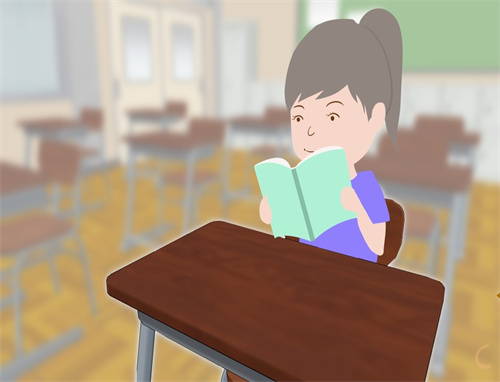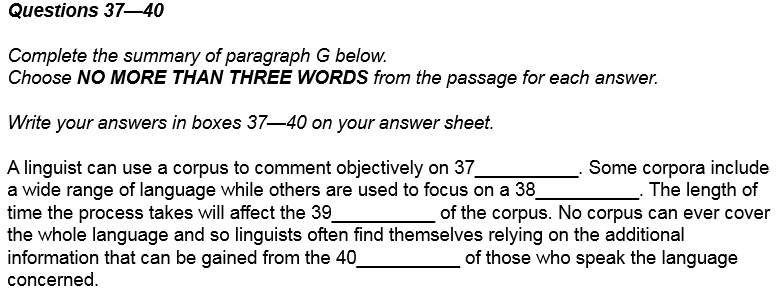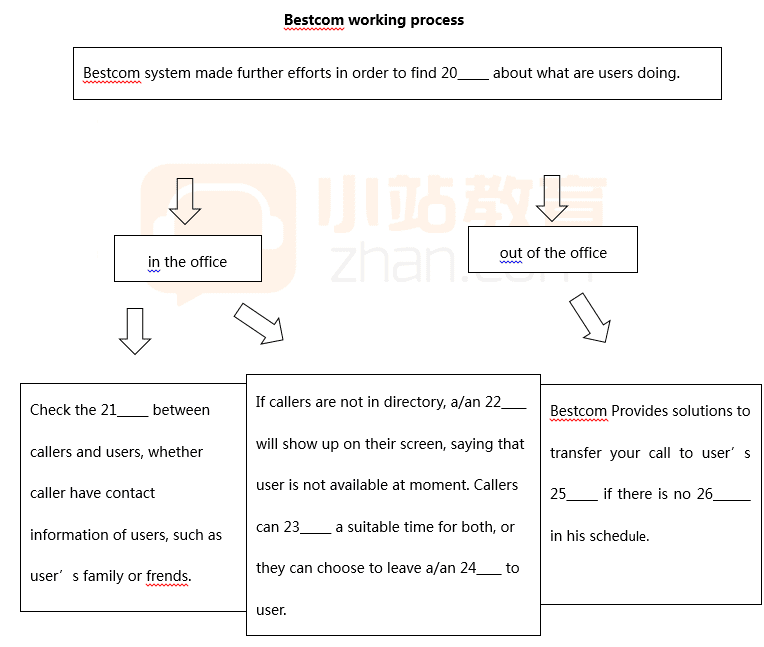雅思A类阅读考察的是限时下的信息搜索提取能力,可以说细节决定雅思阅读的成败,今天小编给大家带来了 A类雅思阅读10大题型之形形色色,希望能够帮助到大家,下面小编就和大家分享,来欣赏一下吧
十面埋伏 A类雅思阅读10大题型之形形色色
一、A类雅思阅读考试概括
A类雅思考试阅读(学术类)部分共有三篇文章,考生需要回答40道题目。每一篇文章所需要回答的问题数量并不相同。每一道问题相对应一个分数。文章内容和题目均出现于试卷中。
阅读考试中所出现的文章是由真实的文章改写而成的。这些文章来源于诸如杂志、期刊、书籍和报纸等途径,与考生未来在大学课程中将阅读到的文章极为相似。文章还包括了非文字性的内容,比如图表、曲线图、以及画图等。文章的写作方式多样,比如记叙文、说明文或者议论文等文体。文章的内容包含即将学习本科、研究生课程或进行职业注册的考生所感兴趣的、与其认知程度相符的常见话题。其中,至少一篇文章会出现详尽的论述形式。所有文章总计长度约在2000到2750字之间。
二、10大官方题型样式
A类雅思考试阅读(学术类)部分共有以下10钟题型,其中一些会有少许的变化。这些题型是:
题型一 选择
这是一个传统题型,大家都很熟悉。但就是这种大家都熟悉的题型,IELTS考试也要弄出新花样。其它考试中,如四级、六级、TOEFL,只有四选一一种形式。IELTS考试的选择题分为四选一和多选多两种。
题型二 填空
又叫摘要填空题。该类题目是一小段文字,是原文或原文中的几个段落主要内容的缩写或改写,我们称之为摘要。摘要中有几个空白部分要求考生填空。按照范围,摘要可分为两种:全文摘要和部分段落摘要。全文摘要,摘要信息来自全文,题目空格的数目较多。部分段落摘要,摘要信息来自原文某几个连续的段落,题目空格的数目较少。
题型三 完成句子
每个题目都是一个陈述句,但留有一个或两个空格,要求根据原文填空。目前考试中,绝大部分都是一个空格,而且在句子的结尾。例如:
THE INTERNATIONAL COMMUNITY HAS BEGUN TO DEMAND…………
题型四 完成笔记、总结、表格或流程图
目中有一个图表或一个表格,其中有一些信息,留出空格,要求根据文章填空。一般没有选项可供选择。
题型五 对图表进行标记
与题型四类似,只不过是填入对应事物的标签,
题型六 为段落或文章的部分选择相对应的小标题
文章由若干段话组成,要求给每段话找个小标题。小标题即指该段话的段落大意,中心思想,主旨。
题型七 寻找信息
其实是一种多选多的选择题。正确答案的数目是已知的。在题目的要求中会告诉你要选出几个选项。题目要求中常WHICH FOUR, WHICH THREE 等字样。
题型八 寻找作者观点、论点或文章中的具体信息
即为我们常说的True /False/Not given(是非题)。
题目是若干个陈述句,要求根据原文所给的信息,判断每个陈述句是对(True)、错(False)、还是未提及(Not Given)。
题型九 分类
在分类题中,一般有三个类别(我们可以称之为甲、乙、丙)以及一些项目,要求是将这些项目分别归入这三个类别之中。在文章中,一般会讲述两种不同的事物,我们姑且称它们为A和B. 类别甲中归入与A类事物有关的项目,类别乙中归入与B类事物有关的项目,而类别丙中归入与A和B都有关的项目。
题型十 配对
Matching(搭配题)是IELTS最常考的题型之一,每次考试至少有一组,很多时候达到两组甚至更多,应该引起同学们的重视。 搭配题通常有三部分组成:题目要求、选相的集合、题目的集合。要求你根据某种关系将题目与选项配对。这种关系在题目要求中说明。搭配题通常不具有顺序性,也就是说,题目的顺序和原文的顺序是不一致的。
三、A类雅思阅读官方备考小贴士
• 应仔细阅读题目的指示和说明,这些信息会告诉你在哪里寻找答案、需要如何回答问题、以及答案字数的限定。题目里的指示还会说明答案是否可以多次使用,并提醒你把答案转抄到答卷上。
• 注意大多数的题型下,题目出现的顺序和信息在文章中出现的顺序都是一致的。
• 进行跳读、扫读练习,以便能在文章片段中快速寻找与题目相关的关键词。将关键词和词组用下划线标记出来,并注意题目中的关键词与文中关键词的联系。在大多数情况下(如填空题),你所填写的答案需符合正确的语法要求。正确的单词拼写和词组搭配是非常重要的,出现错误是要被扣分的。
• 在大多数情况下,你可以在文章里找到需要填写的单词,并应将这个词仔细正确地抄在答卷上。运用笔记、表格、图表或流程图中的内容以及范例来预测答案所涉及的信息的类型。
• 在辅导课上,与同学和老师讨论每种题型下答案可能出现的形式。
• 熟悉同义词以及带有概括作用的词汇,这可以帮助你找到相关信息。
• 练习如何用不同的方式表达相同的意思和信息。
• 思考某些信息之间有什么共性、又有什么不同之处。
• 题海战术并不能让考生按照希望的那样快速提高成绩,这对备考和英语学习是不利的。备考的过程中应该广泛阅读不同的材料,如报纸、期刊、杂志和书籍,并利用这些资源为备考服务。
• 注意熟悉不同的文体,并且练习如何更好地理解这些文体。在练习中熟悉所有雅思考试阅读(学术类)的题型。
• 要注意阅读的方法不止一种。考试的主要任务是找到题目的答案,因此考试中运用的阅读技巧与你需要记忆内容时所用的阅读技巧是不同的。考试过程中不应过于担心出现的生词,同时应该在平时多加练习如何根据上下文的语义来猜测生词的意思,尽量不要用字典查每一个生词,而打断了阅读的连贯性。
• 在任何时候都要认真阅读题目的指示。如果不明确题目的要求,你是很容易出现混淆而导致出错的。
• 在阅读的时候应该注意时间限制,避免在某一道题目上花费过多的时间。
• 注意不要过于依赖于从文中寻找某个词来作答。你应该练习如何改述、在文中找到改述的内容。
雅思考试阅读理解练习试题及答案
★Study Finds Web Antifraud Measure Ineffective
Published: February 5, 2007 New York Times
1. Internet security experts have long known that simple passwords do not fully defend online bank accounts from determined fraud artists. Now a study suggests that a popular secondary security measure provides little additional protection.
2.The study, produced jointly by researchers at Harvard and the Massachusetts Institute of Technology, looked at a technology called site-authentication images. In the system, currently used by financial institutions like Bank of America, ING Direct and Vanguard, online banking customers are asked to select an image, like a dog or chess piece, that they will see every time they log in to their account.
3.The idea is that if customers do not see their image, they could be at a fraudulent Web site, dummied up to look like their bank's, and should not enter their passwords.
4.The Harvard and M.I.T. researchers tested that hypothesis. In October, they brought 67 Bank of America customers in the Boston area into a controlled environment and asked them to conduct routine online banking activities, like looking up account balances. But the researchers had secretly withdrawn the images.
5.Of 60 participants who got that far into the study and whose results could be verified, 58 entered passwords anyway. Only two chose not to log on, citing security concerns.
6. "The premise is that site-authentication images increase security because customers will not enter their passwords if they do not see the correct image," said Stuart Schechter, a computer scientist at the M.I.T. Lincoln Laboratory. "From the study we learned that the premise is right less than 10 percent of the time."
7.He added: "If a bank were to ask me if they should deploy it, I would say no, wait for something better," he said.
8.The system has some high-power supporters in the financial services world, many trying to comply with new online banking regulations. In 2005, the Federal Financial Institutions Examination Council, an interagency body of federal banking regulators, determined that passwords alone did not effectively thwart intruders like identity thieves.
9.It issued new guidelines, asking financial Web sites to find better ways for banks and customers to identify each other online. January 2007 was set as the compliance date, though the council has yet to begin enforcing the mandate.
10.Banks immediately knew what they did not want to do: ask customers to download new security software, or carry around hardware devices that feed them PIN codes they can use to authenticate their identities. Both solutions would add an extra layer of security but, the banks believed, detract from the convenience of online banking.
11.The image system, introduced in 2004 by a Silicon Valley firm called PassMark Security, offered banks a pain-free addition to their security arsenals. Bank of America was among the first to adopt it, in June 2005, under the brand name SiteKey, asking its 21 million Web site users to select an image from thousands of possible choices and to choose a unique phrase they would see every time they logged in.
12.SiteKey "gives our customers a fairly easy way of authenticating the Bank of America Web site," said Sanjay Gupta, an e-commerce executive at the bank. "It was very well received."
13.The Harvard and M.I.T. researchers, however, found that most online banking customers did not notice when the SiteKey images were absent. When respondents logged in during the study, they saw a site maintenance message on the screen where their image and phrases should have been pictured. The error message also had a conspicuous spelling mistake, further suggesting something fishy.
14.Mr. Gupta of Bank of America said he was not troubled by the results of the survey, and stressed that SiteKey had made the bank's Web site more secure. He also said that the system was only a single part of a larger security blanket. "It's not like we're betting the bank on SiteKey," he said.
15.Most financial institutions, like Bank of America, have other ways to tell if a customer is legitimate. The banks often drop a small software program, called a cookie, onto a user's PC to associate the computer with the customer. If the customer logs in from another machine, he may be asked personal questions, like his mother's maiden name.
16.Rachna Dhamija, the Harvard researcher who conducted the study, points out that swindlers can use their dummy Web sites to ask customers those personal questions. She said that the study demonstrated that site-authentication images are fundamentally flawed and, worse, might actually detract from security by giving users a false sense of confidence.
17.RSA Security, the company that bought PassMark last year, "has a lot of great data on how SiteKey instills trust and confidence and good feelings in their customers," Ms. Dhamija said. "Ultimately that might be why they adopted it. Sometimes the appearance of security is more important than security itself."
Questions 1-5
Do the following statements agree with the information given in the passage? Please write
TRUE if the statement agrees with the writer
FALSE if the statement does not agree with the writer
NOT GIVEN if there is no information about this in the passage
1.According to internet security experts, secondary security measures provide little additional protection against fraud.
2.In the Harvard and MIT study, two subjects didn't log on without seeing the correct pictures.
3.According to Schechter, more than 90% of online banking customers studied logged on without seeing the right pictures.
4.The image system is the only security measure that the banks mentioned in the passage have currently.
5.Bank of America is the first bank that adopted the image system.
Questions 6-13
Answer the following questions or complete the following sentences by choosing NO MORE THAN THREE WORDS for each answer.
6.What is ING Direct and Vanguard?
7.What might online banking customers be cheated to give at a fraudulent Web site?
8.What may stop online banking customers from using new verification methods?
9.The key to online banking security is to verify the ______ of customers.
10.Where is PassMark Security located?
11.What is the reason why SiteKey is popular among online banking customers?
12.What was used instead of images in the Harvard and M.I.T. study?
13.How many security methods are mentioned in this passage?
参考答案:
1. 第一段 "Now a study suggests that a popular secondary security measure provides little additional protection."似与问题文字很接近,但是原文中a popular secondary security measure是指特定的一个措施,而非泛指所有secondary security measure。原文没有其它secondary security measure安全有效性的内容。故应选择NG。
2. 见第4、5段内容。第四段 "But the researchers had secretly withdrawn the images."即研究人员撤下了图形,第五段"Only two chose not to log on, citing security concerns.",有两个人因为安全考虑未进入。
3. T 见第6段。
4. F 见第11、14段。
5. F 见第11段 "Bank of America was among the first to adopt it",可见首批采用图形识别软件的银行并非Bank of America一家。
6. A financial institution 见第二段。
7. (their) passwords 见第三段。
8. less convenience 见第十段。
9. identity 见第八、十段。
10. Silicon Valley 见第十一段。
11. easy to use 见第十二段。
12. site maintenance message 见第十三段 "When respondents logged in during the study, they saw a site maintenance message on the screen where their image and phrases should have been pictured."
13. 4 分别见第十段的 "download new security software"和"hardware devices that feed them PIN codes",第十五段的"a small software program, called a cookie",以及本文提到的site-authentication images。
占据雅思阅读高地 把握2大关键因素
首先,通过词汇量和句子分析能力来提高雅思阅读基本功。词汇量的积累不能靠死记硬背,最好的方法就是在日常的阅读中或是做其他练习的时候,以句子形式去记下来,一方面方便理解,另一方面能了解如何应用,同时还可以掌握句子结构。此外,对于雅思阅读高频词汇需要反复记忆,遇到不懂的词汇也不要立即去查,学会利用前后去揣测单词意思,再查解析的时候就能映像更深刻。背单词也不要只背一个,可以用联想法或是思维导图的方式去记忆同根词、同义词、反义词等等。
另一个因素,清楚了解雅思阅读各题型。雅思阅读部分共有3篇文章,每篇1000词左右,有40道题目要回答,时间是一小时。只有对考试题型透彻理解,才能在短时间内做出快速反应,就像开头时说的,如果考生还能从中提取做题技巧,更是事半功倍。同时,熟知不同题型也就了解了雅思阅读考试各题型的考试目的,考生就可以在备考过程中有的放矢,取长补短。
基于以上两个因素,考生进行不断的积累和灵活运用,就能在考试中应答的游刃有余。想要雅思阅读高分,掌握两大因素,考生备考时多加努力,相信大家一定能成功。
A类雅思阅读10大题型分享相关文章:
★ 雅思A类写作历年真题
★ 关于定位词的雅思A类阅读出题思路
★ 雅思A类阅读常见误区
★ 雅思a类阅读8种主要题型技巧总结
★ A类雅思写作的内容和评分要求介绍
A类雅思阅读10大题型分享
A类雅思阅读10大题型之形形色色,希望能够帮助到大家,下面小编就和大家分享,来欣赏一下吧十面埋伏 A类雅思阅读10大题型之形形色色一、A类雅。下面小编给大家分享A类雅思阅读10大题型分享,希望能帮助到大家。 A类雅思阅读10大题型分享文档下载网址链接:
上一篇:雅思阅读中的空杯思想详解





